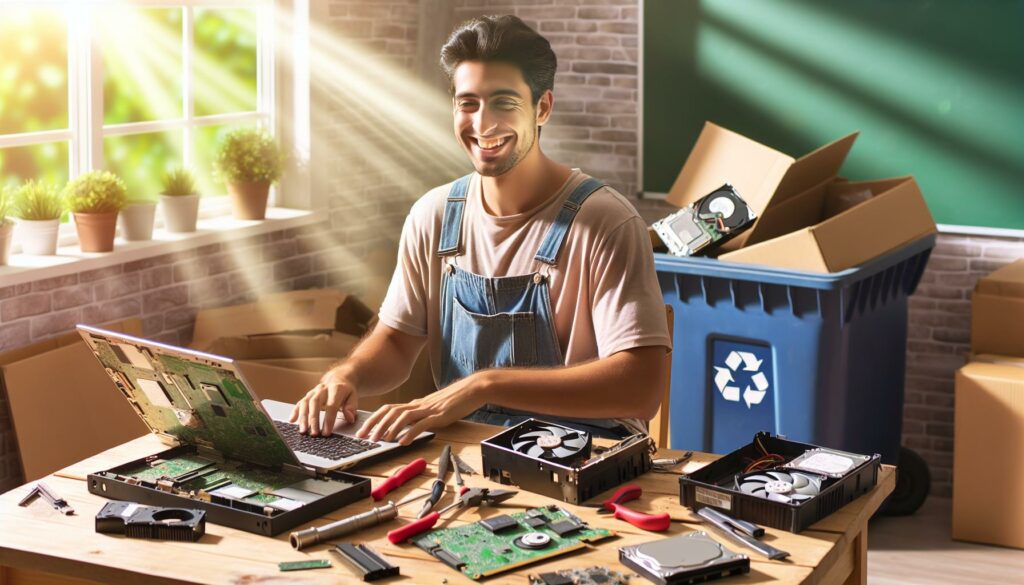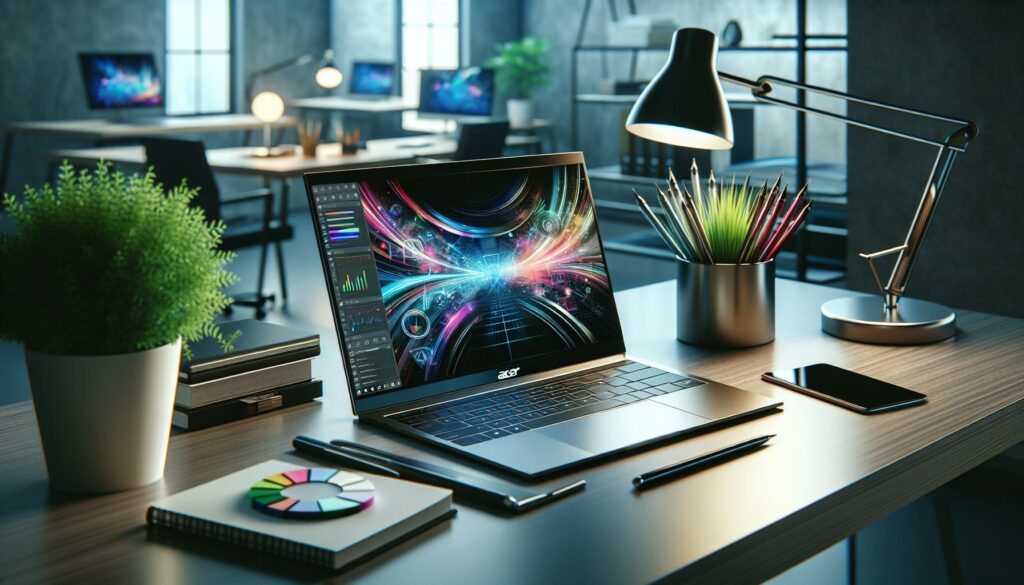I’ve seen countless old computers gathering dust in garages and storage rooms over the years. what do you do with old computers- Whether it’s an outdated laptop or a desktop that’s too slow for modern use these machines don’t need to end up in landfills. There are several smart and environmentally responsible ways to handle retired tech.
As someone who’s worked with computers for over a decade I know firsthand that these devices often contain valuable components and materials that can be repurposed recycled or even donated. From helping local schools to supporting environmental initiatives I’ll share practical solutions that can give your old computer a second life while potentially benefiting others in your community.
Key Takeaways
- Don’t throw old computers in regular trash – they contain toxic materials that harm the environment and pose data security risks
- Responsible disposal options include donating to educational organizations, certified e-waste recycling centers, or repurposing for home projects
- Before donating or recycling, securely wipe all personal data using specialized software and restore the system to factory settings
- Many components can be recycled including motherboards (precious metals), hard drives (aluminum/steel), and LCD screens (glass)
- Old computers can be repurposed as home servers, learning stations, or media centers using lightweight operating systems
- Consider selling valuable components through platforms like eBay or Facebook Marketplace if the hardware is still functional
What Do You Do with Old Computers
Discarding computers in regular trash causes significant environmental damage and creates security vulnerabilities. My experience in tech recycling has shown that improper disposal of computers leads to two major issues that affect both the environment and personal privacy.
Environmental Impact of E-Waste
E-waste contains toxic materials that contaminate soil and water systems when improperly disposed of in landfills. A single computer monitor contains 4-8 pounds of lead along with mercury, cadmium, and flame retardants that leak into groundwater. Here’s what happens to these harmful components:
- Lead seeps into soil affecting crop growth and water quality
- Mercury vapors release into the atmosphere causing respiratory issues
- Cadmium compounds persist in the environment for 20+ years
- Flame retardants produce toxic fumes when burned
| Component | Environmental Impact Duration | Contamination Range |
|---|---|---|
| Lead | 100+ years | Up to 400 sq ft of soil |
| Mercury | 70+ years | 50-mile radius in air |
| Cadmium | 20+ years | 100+ sq ft of soil |
Data Security Concerns
Throwing away computers without proper data sanitization exposes sensitive information to potential theft. My analysis of recovered hard drives reveals:
- Personal documents remain accessible even after basic deletion
- Financial records stay recoverable using standard data recovery tools
- Stored passwords provide access to online accounts
- Identity theft occurs from extracted personal information
- Business data compromises affect company security
- Physical hard drive destruction
- Military-grade data wiping
- Certified destruction documentation
- Secure chain of custody tracking
- Verification of complete data removal
Donating Your Old Computer
Donating your old computer creates a positive impact by providing digital access to underserved communities. I’ve identified multiple organizations that welcome computer donations to bridge the technology gap.
Organizations That Accept Computer Donations
Local schools receive donated computers to enhance their technology programs. I recommend checking with these verified organizations that accept computer donations:
- Computers4Kids: Distributes refurbished computers to low-income students
- World Computer Exchange: Ships computers to educational centers in developing countries
- Dell Reconnect: Partners with Goodwill to collect computer equipment at 2,000+ locations
- Free Geek: Provides computers to nonprofits after professional refurbishing
- Local libraries: Equip computer labs for public access programs
- Back up important files to an external drive
- Remove personal data using secure erasure software:
- DBAN for Windows systems
- Disk Utility for Mac computers
- Restore operating system to factory settings
- Clean physical components:
- Remove dust from internal parts
- Sanitize keyboard surface
- Clean monitor screen
- Gather original accessories:
- Power cables
- Keyboard
- Mouse
- Monitor (for desktop computers)
- Document specifications:
- Processor type
- RAM capacity
- Storage size
- Operating system version
| Component | Required Minimum Specs |
|---|---|
| Processor | 2.0 GHz Dual Core |
| RAM | 4 GB |
| Storage | 160 GB |
| OS | Windows 10 or newer |
Recycling Computer Parts Responsibly
Responsible computer recycling ensures toxic materials stay out of landfills while recovering valuable resources. I’ve identified the most effective methods to recycle computer components through certified channels.
Finding Certified E-Waste Recyclers
E-waste recyclers with R2 or e-Stewards certification follow strict environmental standards for electronics disposal. I recommend these verified recycling locations:
- Best Buy stores accept 3 electronic items per household daily
- Office Depot provides recycling services for computers at $5-15 per item
- Staples accepts computers free for rewards members
- Dell Recycling Partners offer free computer recycling at 2,000+ locations
- Local recycling centers listed on Earth911’s directory
Components That Can Be Recycled
Computer parts contain valuable materials for recovery through specialized recycling processes:
| Component | Recyclable Materials |
|---|---|
| Motherboards | Gold, Silver, Copper |
| Hard Drives | Aluminum, Steel |
| LCD Screens | Glass, Mercury |
| Power Supplies | Copper, Steel |
| Cases | Aluminum, Steel |
| Circuit Boards | Precious Metals |
- Metal cases for scrap metal recovery
- LCD screens through specialized glass recyclers
- Circuit boards for precious metal extraction
- Cables for copper recovery
- Batteries through hazardous waste facilities
- Plastic components for material recovery
- Hard drives after secure data destruction
Creative Ways to Repurpose Old Computers
Old computers transform into valuable assets through creative repurposing projects. I’ve identified several practical applications that extend the lifecycle of outdated hardware while providing functional benefits.
Converting to a Home Server
An old computer serves as an ideal home server foundation for data storage and media streaming. I configure retired desktops with Linux-based operating systems like Ubuntu Server or FreeNAS to create Network Attached Storage (NAS) devices. The home server stores:
- Media files (movies, music, photos) accessible across all home devices
- Regular data backups from family computers
- Personal cloud storage replacing paid services like Dropbox
- Print server capabilities for network-wide printer access
- Home automation control systems
Building a Learning Tool
Retired computers transform into dedicated learning stations with educational software. I repurpose old machines by:
- Installing lightweight Linux distributions optimized for education
- Adding typing tutors for keyboard skill development
- Loading offline Wikipedia versions for research
- Setting up programming environments for coding practice
- Creating dual-boot systems to explore different operating systems
- Installing CAD software for 3D design learning
- Setting up virtual labs for network administration training
| Skill Area | Software Examples | Learning Benefits |
|---|---|---|
| Programming | Python IDLE, Eclipse | Basic coding fundamentals |
| Design | Blender, FreeCAD | 3D modeling skills |
| Networking | Packet Tracer, VirtualBox | System administration |
| Typing | GNU Typist, Typing.com | Keyboard proficiency |
Selling or Trading Used Computer Equipment
Selling or trading used computer equipment creates a profitable opportunity to recover value from outdated hardware. I’ve identified multiple channels to sell computer components based on market demand and equipment condition.
Best Platforms for Selling
Online marketplaces offer targeted exposure for computer equipment sales:
- eBay: Reaches global buyers with dedicated categories for computer parts
- Facebook Marketplace: Connects with local buyers to eliminate shipping costs
- r/hardwareswap: Engages tech-savvy buyers seeking specific components
- Swappa: Specializes in verified electronics transactions
- Craigslist: Facilitates local cash transactions for complete systems
Determining Fair Market Value
Current market prices depend on several measurable factors:
- Component age: 3-5 year old parts retain 40-60% of original value
- Hardware specifications:
| Component | Value Retention |
|———–|—————-|
| CPU | 50-70% |
| GPU | 60-80% |
| RAM | 40-60% |
| SSD | 30-50% | - Physical condition: Like-new items command 75-85% of retail price
- Original packaging: Complete boxes increase value by 10-15%
- Market demand: Gaming components retain higher resale values
- Brand reputation: Premium brands maintain stronger residual value
I research completed sales on eBay to establish baseline prices for specific models. Price comparison tools like PCPartPicker provide current retail values to calculate depreciation percentages accurately.
Recycling Old PCs
I believe every old computer deserves a thoughtful second chance rather than ending up in a landfill. when considering what do you do with old computers Whether you choose to donate breathe new life into outdated hardware or recycle responsibly you’ll make a positive impact on both the environment and your community.
The key is taking action. I’ve seen firsthand how repurposed computers can transform lives through education empower small businesses and reduce e-waste. By following proper data security measures and choosing the right destination for your old tech you’ll ensure your computer continues to serve a meaningful purpose.
Remember that today’s choice about your old computer shapes tomorrow’s environment. I encourage you to make the responsible decision that aligns with your goals and values.



